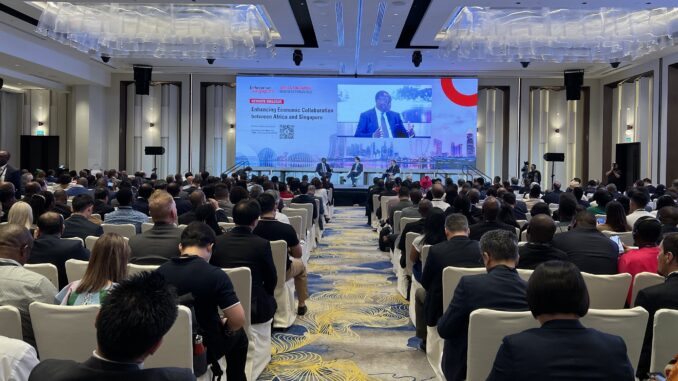
In a keynote address delivered at the Africa Singapore Business Forum 2023, Gan Kim Yong, Singapore’s Minister for Trade and Industry (MTI), declared the need to strengthen partnerships between southeast Asia and Africa to help address the global challenges currently plaguing the world
In the speech, which was published on the MTI website, the Minister expressed his delight at seeing the variety of attendees at the forum, which will only serve to build stronger and deeper Africa-Singapore relations.
The Minister stated, “We must continue to strengthen our partnerships to address the grave challenges we face today. Geopolitical conflicts, pandemics, growing protectionism, and the climate crisis remind us of the fragility of our political and economic systems. Our inter-dependence ensures that even distant events can adversely affect us. Our best response to such challenges is to deepen our cooperation with one another – not just within our regions but across regions.”
While acknowledging ambitious efforts to integrate Africa’s regional market – such as the African Continent Free Trade Area (AfCFTA) – the Minister stated African businesses should also seek to seize opportunities outside of the continent. He said that it was vital for them to remain open and connected to the rest of the world, even as AfCFTA members build stronger links with one another.
Continuing, Gan Kim Yong stated that Southeast Asia, like Africa, is one of the largest and fastest-growing regions in the world with a wide variety of trade and investment opportunities open to businesses. He added that ASEAN’s ‘open regionalism’ policy, enables member states individually and collectively to benefit from deepening trade and investment ties to countries outside of the region to ultimately achieve greater economic prosperity and security for its people.
Enhancing Africa-Asia trade
With Africa’s trade with Southeast Asia constituting a mere 2.2% of the latter’s total trade with the world (amounting to US$57.6bn in 2021) the Minister expressed how there is room to dramatically enhance this and, alongside this, increase African investments into the region (in 2021 collective African investments into ASEAN countries amounted to just 0.1% of total inward investments the region received).
“The good news is that there is potential for growth. We should, therefore, strive for closer ties between Southeast Asia and Africa, a process that Singapore could help catalyse as a node in Africa-Asia trade. Singapore trades with almost every country in Africa. In the past 12 months, Prime Minister Lee Hsien Loong has made official visits to Rwanda, South Africa, and Kenya to strengthen bilateral ties, including business linkages.”
In the reverse, the Minister also expressed how the Ministry is working to grow the list of Singapore companies seeking to expand their business to Africa and encouraged companies to seek opportunities in the continent.
To help achieve all this, Singapore is reportedly striving to improve the connectivity between the regions through government-to-government cooperation and people-to-people exchanges to deepen mutual understanding and encourage trade and investment.
Citing a recent example, the Minister said that the Kenya-Singapore Investment and Protection Agreement has recently come into force. Such agreements, he added, provide certainty to companies from both Africa and Singapore that operate in each other’s markets to help boost trade and investment flows. He also announced that Singapore’s Ministry of Foreign Affairs and Ministry of Trade and Industry will soon offer a capacity-building course in trade negotiations as part of the Singapore Cooperation Programme’s Singapore – Africa Partnership Package. The course, which will start in January next year, is designed to meet the needs of African trade negotiators, even as it helps to foster stronger relations between governments and officials.
With such developments, the Minister surmised he is very optimistic about the future of Africa-Asia collaborations and welcomed any new opportunities to deepen the relations.
He concluded, “I would like to leave you with two messages. First, governments should practice open regionalism. Regional integration and remaining open and connected to other regions are not mutually exclusive. The outcomes for our businesses and peoples will be better if we do both.
“Second, Singapore and African companies should be bold and expand into each other’s regions to seek opportunities. Governments can, and will provide strong support, but ultimately, where business is done depends on the decisions of business leaders like you.”
